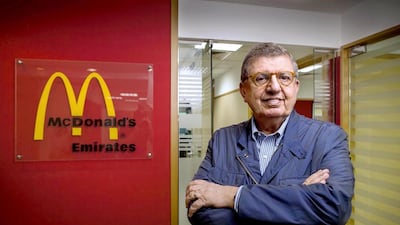Rafic Fakih is the managing director and partner at McDonald’s UAE. The French-Lebanese, 72, has been working for the franchise, which has 106 outlets in the UAE and is operated by Emirates Fast Food, since 1994.
What are your favourite things to do on the weekend?
Having lived in the UAE since 1976, the country continues to surprise me with its beautiful nature and rich culture. I continue to learn about it, and discover it anew each day I spend on this land. And, I should admit, the more I learn about it, the more attached I become to it. Exploring new places here is definitely one of my favourite things to do on the weekends and in my downtime – alongside spending quality time with my beloved family.
What do you consider to be your favourite hobby?
My ongoing passion for the work I do makes my career my favourite hobby, one which I look forward to pursuing each day for the rest of my life. I look to learn something new every day. My love for reading teaches me a lot about life, and adds to my knowledge and experience just as much as my personal experiences do. I also have a great interest in contemporary world history. Some people think that history has little or no effect on our present and future. I personally believe that it is the very reason behind us being who we are today. If it is well evaluated and considered, it can be a great asset to achieve future victories.
What can’t you live without?
My work and my family are, most certainly, the two things I could not live without. They are my greatest motivations in dealing with the challenges and opportunities I face each day in life. Both of them are the driving forces in my life for every plan I had, every achievement I realised, and every goal I am looking to fulfil in the future.
What do you consider the secret to your success?
Work, work, and work – I cannot stress this enough. Then, comes education – and the little bit of luck that helped me along my way.
What advice would you offer others starting out in your business?
The one and only mantra that I would suggest to anyone who has an intention to start a project, not only in our field but in any business sector is: work more and speak less. Many people have seen their great ideas getting lost along the years because the energy they should have spent on putting them into actions was unfortunately wasted in emotional passion for these ideas. Passion is necessary for any idea to grow. However, without hard work, one can go nowhere with their ambitions. Putting your words into actions rather than spending the time talking about them is what will make you achieve your goals.
How do you achieve a work-life balance?
As previously stated, I am very passionate when it comes to my career. For me, a life without work is a life without achievement, and therefore a life without satisfaction or balance. It is not easy to keep balance between one’s work and personal lives, especially when both of them mean the world to you. It comes with time and experience, but, my most important tip is always to remember what your priorities are in life. Once you learn how to manage your priorities, it becomes easier to manage the balance.
How do you relax after the working day?
One of my favourite activities after a long working day is swimming; it refreshes me and allows me to unwind. Another thing that helps me freshen up and to boost my energy for another challenging day is watching political shows. Politics shift our lives in different ways, so one should always be aware of what is going on around them.
If you weren’t managing director of McDonald’s UAE, what else would you be doing?
I graduated with a degree in engineering that I consider as a discipline that challenges its practitioner in different ways while giving her/him enough room for creativity and innovation. I suppose if I weren’t in my current role, I would be utilising my qualifications in civil engineering. I previously worked as a construction engineer in Lebanon and I was enjoying it – but the civil war led me to shift my career towards a totally different path, and I relocated to the UAE to become the person I am today.
abouyamourn@thenational.ae
Follow The National's Business section on Twitter

